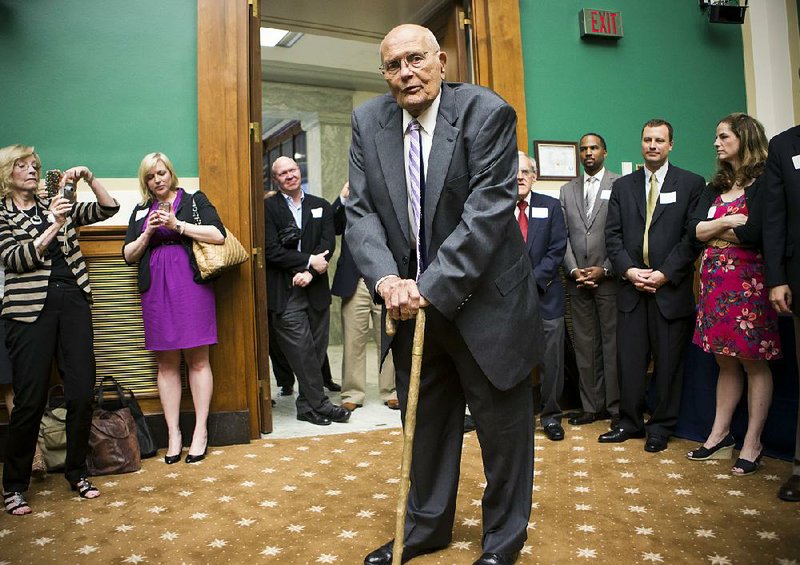WASHINGTON - Rep. John Dingell, D-Mich., the longest-serving member of Congress in history, announced Monday that he would not seek re-election at the end of his current term.
Dingell’s retirement, first announced by Detroit newspapers and confirmed by Democratic leadership aides, will come at the end of this year - the end of his 29th full term - and represents the end of a historic tenure in the House that began in 1955. That year, Dingell, at the age of 29, succeeded his father after he died.
Dingell, 87, who amassed considerable power as the chairman of the Energy and Commerce Committee, in June became the longest-serving member of Congress with 20,997 days as a representative. Until then, the record had been held by Sen. Robert C. Byrd, D-W.V a. Dingell has served under 11 presidents.
In a statement released Monday, Dingell said: “Around this time every two years, my wife, Deborah, and I confer on the question of whether I will seek re-election. My standards are high for this job. I put myself to the test and have always known that when the time came that I felt I could not live up to my own personal standard for a member of Congress, it would be time to step aside for someone else to represent this district. That time has come.”
Dingell asserted jurisdiction over vast expanses of federal policy as the chairman of the Energy Committee. In 2008, his fellow Democrats ousted him from the committee chairmanship, where he had reigned as the top Democrat for nearly 30 years.
As he announced his retirement, Dingell talked about the failings of current lawmakers.
“This Congress has been a great disappointment to everyone, members, media, citizens and our country,” he said. “Little has been done in this Congress, with 57 bills passed into law.”
He added, “There will be much blaming and finger pointing back and forth, but the members share fault, much fault; the people share much fault, for encouraging a disregard of our country, our Congress and our governmental system.”
Then he asked Americans to work together. “What unites us is far greater than what divides us,” he said. “No president should have to tell a Congress that if that august body cannot do its task he will do it by executive order.”
Dingell, 6 feet 3 inches tall, had grown stooped in his later years, walking with the help of a cane (from Harrods in London) or wheeling around on a motorized scooter (with a plaque proclaiming him “the Dean” of the House). But Dingell said his retirement had as much to do with the changing nature of the body in which he served as with any health concerns.
He had recently begun to bemoan the current culture of Congress - its members’ inability to work together and compromise - and in an interview with The Detroit News, he was even more pointed: “I find serving in the House to be obnoxious,” he told the newspaper. “It’s become very hard because of the acrimony and bitterness, both in Congress and in the streets.”
Dingell’s retirement is also another blow for Rep. Nancy Pelosi of California, the minority leader, who has lost several of her key liberal allies to retirement. Earlier this year, Reps. George Miller and Henry A. Waxman, both of California, also announced their retirements.
Dingell became famous for his so-called Dingell-grams, the elaborate written requests for information from people or agencies he planned to investigate, and he considered his committee’s oversight powers to be far-reaching, often pointing to a map of the Earth when asked what his jurisdiction was.
He also became well known for his support of progressive causes. He voted for the 1964 Civil Rights Act - a vote he considers his most important - and presided over the passage of Medicare. The gavel he used still sits on his desk. Following the lead of his father, John, who introduced his own national health-care legislation at the beginning of every Congress, Dingell continued the tradition and voted in favor of President Barack Obama’s signature health-care law.
“While someday a legislator may come along to serve longer than John’s nearly six decades on the Hill, his remarkable legacy of public service will remain unmatched,” former President Bill Clinton said in a statement.
Deborah, his wife of more than three decades, is a power in her own right in Washington. She has served as an auto-industry executive and is a close adviser to her husband. She recently considered, but ultimately decided against, a Senate bid. There is speculation that she might run for her husband’s seat.
Front Section, Pages 3 on 02/25/2014
